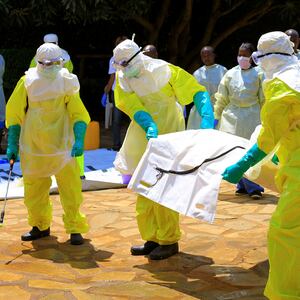The U.S. is not sending experts to the epicenter of the Ebola outbreak in the Democratic Republic of Congo because of militia attacks and is trying to help contain the crisis from the capital more than a thousand miles away, government officials said on Wednesday.
The outbreak in the DRC has become the become the worst in the country’s history, and the head of the World Health Organization said this week that he expects it will last another six months. Nearly 175 people have died from confirmed cases of Ebola, but health officials suspect hundreds more are tied to the highly contagious hemorrhagic fever, which attacks organs and the immune system.
While nine previous Ebola outbreaks in the Congo were contained successfully, U.S. officials said efforts to stop it this time are complicated by violence in the affected area. Just this week, there were two attacks by local militia vying for power in the civil war-wracked nation.
ADVERTISEMENT
The U.S. said it has not sent health workers or troops to the epicenter of the Ebola outbreak because of the security situation. It has a disaster response team in Kinshasa, the capital city, and is working with Rwanda, Uganda, and Burundi to keep the outbreak from crossing borders.
The U.K. has sent a senior epidemiologist to the outbreak site twice and announced this week that it will deploy two more teams—one to operate a lab and another to work on drug trials.
The larger the outbreak gets the greater the possibility that someone from one of the affected areas who is unknowingly infected could travel outside of Congo and spread the disease to another country. Because of Ebola’s incubation period, it can be days or weeks before someone shows symptoms.
In 2014, a Liberian man visiting family in Dallas died of Ebola, and two health care workers who treated him contracted the disease but survived. A doctor who returned to the U.S. from working in Guinea also fell ill but survived.
U.S. officials said that the administration has been undertaking an “aggressive response” to the outbreak and have not ruled out the possibility of a military deployment. They said a variety of experimental therapies and vaccines have been deployed on a “compassionate” basis.







